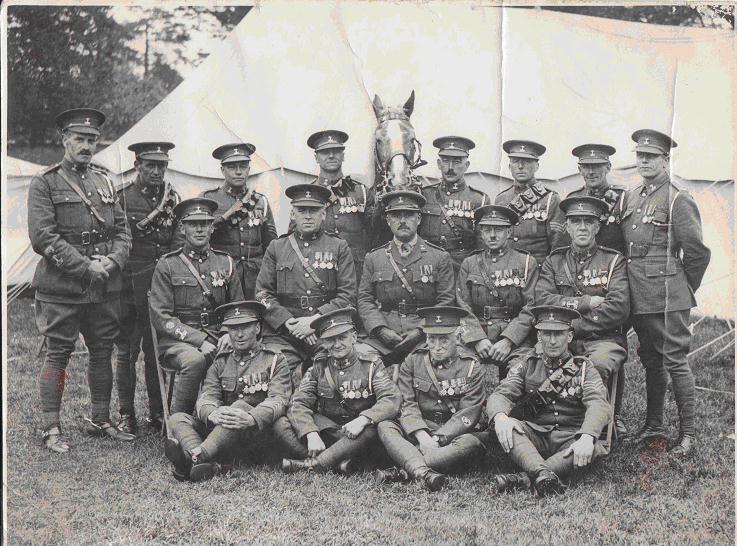With Songster's passing the country lost its oldest warhorse, and the Leicestershire Yeomanry lost a faithful animal which had endeared itself to the unit
Songster, a chestnut gelding of some fifteen hands, was the oldest War Horse of the First World War. This grand old veteran passed away in retirement at his home at West Beacon Farm, Woodhouse Eaves, Leicestershire, in January 1940.
By a strange coincidence, the horse's last minutes were spent in the company of two old Leicestershire Yeomanry companions, Regimental Quartermaster Sergeant Fred Hunter and Sergeant Major Fred Pepper who, on leave from their unit, had called at the farm on a surprise visit. Songster was forty years old when he died and he now lies beneath a marked grave on the farm. His exemplary service in the Great War brought many decorations from the Leicestershire Yeomanry.
Songster was fourteen at the outbreak of war and originally turned down for service due to his age. He was, nevertheless, transported to France in November 1914 with the Leicestershire Yeomanry, with Trooper Bert Main as his mount.
Songster survived the horrors of war with the large-scale slaughter of human (and animal) life and was fortunate to return to England in 1919. As his original owner was unknown Songster was put up for sale at Spelman's (London) horse repository. On learning the news, Trooper Main travelled to London and purchased him, along with Fenian, another Leicestershire Yeomanry veteran and both horses were taken to West Beacon Farm, Woodhouse Eaves. Here Songster was put to use by ex-Squadron Sergeant Major Harry Poole.
The transfer to the farm, however, did not entirely sever Songster's connections with the Leicestershire Yeomanry. He had not had time to forget the meaning of the bugle calls. In 1920, when the Leicestershire Yeomanry marched past Beacon Farm on their way to their annual camp Songster heard the sound of the band and galloped towards the men. The men of the Yeomanry acknowledged their old friend and Songster joined them at camp.
Songster would continue to be claimed by the Yeomanry's annual camp until 1935. Afterwards, he led a more leisurely life with just a weekly appearance 'to keep him out of trouble' drawing a milk float for Harry Poole to Loughborough Market.
Nevertheless, his noteworthy antics were not easily forgotten by those who knew him the best. During Songster's time in France, Trooper Bert Main would recall how he and Songster won a cross-country race. He was also clearly an intelligent horse. When the horse lines were hit by artillery, and many horses were killed, Songster was nowhere to be seen having broken free, only to return to the lines once the shelling was over, and therefore avoiding injury.
A more remarkable story concerning Songster is of his ability to climb stairs.
By a strange coincidence, the horse's last minutes were spent in the company of two old Leicestershire Yeomanry companions, Regimental Quartermaster Sergeant Fred Hunter and Sergeant Major Fred Pepper who, on leave from their unit, had called at the farm on a surprise visit. Songster was forty years old when he died and he now lies beneath a marked grave on the farm. His exemplary service in the Great War brought many decorations from the Leicestershire Yeomanry.
Songster was fourteen at the outbreak of war and originally turned down for service due to his age. He was, nevertheless, transported to France in November 1914 with the Leicestershire Yeomanry, with Trooper Bert Main as his mount.
Songster survived the horrors of war with the large-scale slaughter of human (and animal) life and was fortunate to return to England in 1919. As his original owner was unknown Songster was put up for sale at Spelman's (London) horse repository. On learning the news, Trooper Main travelled to London and purchased him, along with Fenian, another Leicestershire Yeomanry veteran and both horses were taken to West Beacon Farm, Woodhouse Eaves. Here Songster was put to use by ex-Squadron Sergeant Major Harry Poole.
The transfer to the farm, however, did not entirely sever Songster's connections with the Leicestershire Yeomanry. He had not had time to forget the meaning of the bugle calls. In 1920, when the Leicestershire Yeomanry marched past Beacon Farm on their way to their annual camp Songster heard the sound of the band and galloped towards the men. The men of the Yeomanry acknowledged their old friend and Songster joined them at camp.
Songster would continue to be claimed by the Yeomanry's annual camp until 1935. Afterwards, he led a more leisurely life with just a weekly appearance 'to keep him out of trouble' drawing a milk float for Harry Poole to Loughborough Market.
Nevertheless, his noteworthy antics were not easily forgotten by those who knew him the best. During Songster's time in France, Trooper Bert Main would recall how he and Songster won a cross-country race. He was also clearly an intelligent horse. When the horse lines were hit by artillery, and many horses were killed, Songster was nowhere to be seen having broken free, only to return to the lines once the shelling was over, and therefore avoiding injury.
A more remarkable story concerning Songster is of his ability to climb stairs.
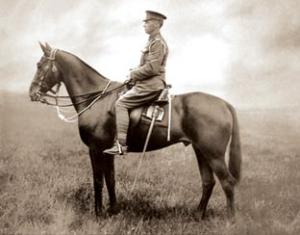
Trooper Bert Main on Songster
Going Upstairs
On many occasions Songster was ridden by Trooper Main up the stairs leading to the clubroom at the Old Boot Hotel, Loughborough, and after walking proudly round the room and enjoying some beer the horse would achieve the even more difficult task of descending the stairway. Today on the brass rods of the stairs there are indentations credited to Songster's hooves.Buried with Medals
Songster was buried with his medals and ribbons at West Beacon Farm. He had been awarded the Mons Star, the 1914-1915 Star, the General Service Medal, the Victory Medal and two Territorial Long Service Medals.
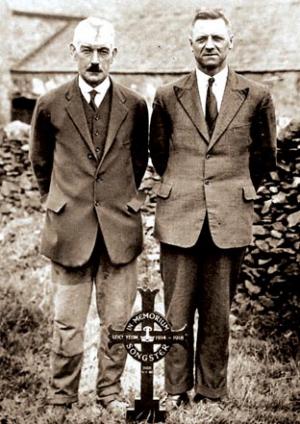
Harry Poole and Bert Main standing over Songster's grave
The original marker for Songster's grave is kept in the Carillon War Memorial Museum. A replica of the marker, commissioned by the Leicestershire Yeomanry Association and the Carillon War Memorial Museum, was placed on Songster's grave in a military ceremony in June 2018.
Children's book
A book for children Songster: Loughborough's own war horse, written by Alison Mott and extensively illustrated by Liz Waddell, was published by the Loughborough Carillon Tower & War Memorial Museum in 2018.
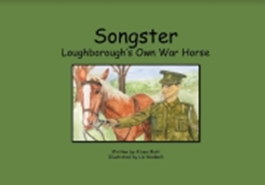
Armature
An armature of Songster by artist Jenni Cairns and commissioned by Charnwood Council was placed near the Carillon War Memorial in Queen's Park, Loughborough, in 1919. The armature was unveiled by 12-year-old Lewis Main, the great-grandson of Bert Main. Lewis was joined by his father Andrew and grandfather, Bert's son, Barry.
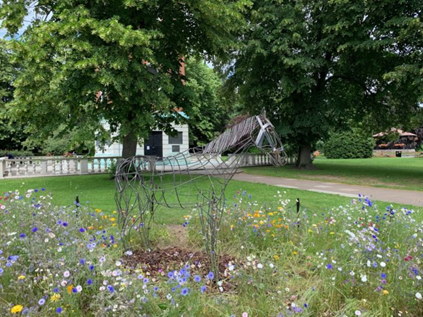
The Armature, Queen's Park
A book for children Songster: Loughborough's own war horse, written by Alison Mott and extensively illustrated by Liz Waddell, was published by the Loughborough Carillon Tower & War Memorial Museum in 2018.

Armature
An armature of Songster by artist Jenni Cairns and commissioned by Charnwood Council was placed near the Carillon War Memorial in Queen's Park, Loughborough, in 1919. The armature was unveiled by 12-year-old Lewis Main, the great-grandson of Bert Main. Lewis was joined by his father Andrew and grandfather, Bert's son, Barry.

The Armature, Queen's Park

